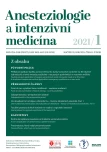-
Medical journals
- Career
Shaken adult syndrome or a neurological complication of epidural anesthesia?
Authors: A. Bauerová; P. Nosková; J. Bláha
Authors‘ workplace: Klinika anesteziologie, resuscitace a intenzivní medicíny, 1. lékařská fakulta Univerzity Karlovy v Praze, a Všeobecná fakultní nemocnice v Praze
Published in: Anest. intenziv. Med., 32, 2021, č. 1, s. 52-54
Category: Case Reports
Overview
Shaken adult syndrome is a diagnosis related to the long-known shaken baby syndrome. However, the existence of this diagnosis in adults is debatable and only a minimal number of cases have been published worldwide so far. This case report describes a patient who underwent a caesarean section under epidural anesthesia and developed neurological symptoms several hours after the procedure, indicating an acute worsening of her recurrent chronic subdural hematoma. Upon closer inspection, it was clarified that she was a long-term physically abused woman with the shaken adult syndrome. The aim of this case report is to point out the fact that not every neurological symptom which manifests itself in close connection with the provided anesthesiological care is directly related to it.
Keywords:
chronic subdural hematoma – postdural puncture headache – Domestic violence
Sources
1. Isono N, Santou K, Ueda N, Endou T. Acute subdural haematoma accompanied by anorexia nervosa. BMJ Case Rep. 2019; 12(9): e231156. doi:10.1136/bcr-2019-231156.
2. Pounder DJ. Shaken adult syndrome. Am J Forensic Med Pathol. 1997; 18(4): 321–324. doi: 10.1097/00000433-199712000-00001.
3. Carrigan TD, Walker E, Barnes S. Domestic violence: The shaken adult syndrome. J Accid Emerg Med. 2000; 17(2): 138–139. doi: 10.1136/emj.17. 2. 138.
4. Azari AA, Kanavi MR, Saipe NB, Potter HD, Albert DM, Stier MA. Shaken adult syndrome: Report of 2 cases. JAMA Ophthalmol. 2013; 131(11): 1468–1470. doi: 10.1001/jamaophthalmol. 2013.5073.
5. Coker AL, Smith PH, Bethea L, King MR, McKeown RE. Physical health consequences of physical and psychological intimate partner violence. Arch Fam Med. 2000; 9(5): 451–457. doi: 10.1001/archfami.9. 5. 451.
6. Parker B, McFarlane J, Soeken K. Abuse during pregnancy: Effects on maternal complications and birth weight in adult and teenage women. Obstet Gynecol. 1994; 84(3): 323–328.
7. Zaheen Z, Aqeel F, Asad MG, Geeta, Sahito RM, Rekha. Fetomaternal outcome after physical Domestic Violence during pregnancy. Prof Med J. 2020; 27(01). doi: 10.29309/tpmj/2019. 27. 01.3515.
8. Campbell JC. Health consequences of intimate partner violence. Lancet. 2002; 359(9314): 1331–1336. doi:10.1016/S0140-6736(02)08336-8.
9. Cokkinides VE, Coker AL, Sanderson M, Addy C, Bethea L. Physical violence during pregnancy: Maternal complications and birth outcomes. Obstet Gynecol. 1999; 93(5): 661–666. doi: 10.1016/S0029-7844(98)00486-4.
10. European Union Agency for Fundamental Rights. Violence against Women: An EU‑Wide Survey. 2014.
11. Rachana C, Suraiya K, Hisham AS, Abdulaziz AM, Hai A. Prevalence and complications of physical violence during pregnancy. Eur J Obstet Gynecol Reprod Biol. 2002; 103(1): 26 – 29. doi: 10.1016/S0301-2115(02)00022-2.
12. Ulrich YC, Cain KC, Sugg NK, Rivara FP, Rubanowice DM, Thompson RS. Medical care utilization patterns in women with diagnosed domestic violence. Am J Prev Med. 2003; 24(1): 9–15. doi: 10.1016/S0749-3797(02)00577-9.
Labels
Anaesthesiology, Resuscitation and Inten Intensive Care Medicine
Article was published inAnaesthesiology and Intensive Care Medicine

2021 Issue 1-
All articles in this issue
- Vzdělávání mladých lékařů v době COVIDu
-
Positive pressure application of oxygen using Venturi nozzle Corovalve made on a 3D printer.
A simple and inexpensive method applicable in emergency conditions on a mass scale - Mezinárodní konsenzuální doporučení k postintenzívnímu syndromu
-
Point of care examination of blood clotting –
current possibilities - Gabapentinoids in the perioperative period
- Ketamin – nezávislost disociativní a analgetické působnosti
- Perorální dexmedetomidin?
- One hundred and ninety years since discovery of chloroform – history of inhalational anaesthetics. Part 1
- Peroperační maligní hypertermie – bude vhodný předoperační genetický skríning?
- Fascial planes for regional anesthesia of the lower limb
- A rare complication of central venous catheter insertion
- Pneumothorax, which was not a pneumothorax
- Posttraumatická stresová porucha – až znepokojivý postintezivní výskyt
- Předejde umělá inteligence peroperační hypotenzi?
- Shaken adult syndrome or a neurological complication of epidural anesthesia?
-
Biochemické vyšetření moči v intenzivní péči –
naučme se ho používat častěji - Mimotělní eliminace CO2 u pacientů v intenzivní péči – konsenzus evropského kulatého stolu
- Doporučení pro anestezii a sedaci u kojících žen
-
Stanovisko výboru ČSARIM 14/2021
Aktuální stav dostupnosti a poskytování intenzivní péče v rámci pandemie onemocnění COVID-19 -
MEZIOBOROVÉ STANOVISKO (evidenční číslo ČSARIM: 15/2021)
K POUŽITÍ BAMLANIVIMABU U PACIENTŮ S COVID-19 - Zajímavosti, tipy a triky, informace z jiných oborů
- Anaesthesiology and Intensive Care Medicine
- Journal archive
- Current issue
- Online only
- About the journal
Most read in this issue- Doporučení pro anestezii a sedaci u kojících žen
-
Point of care examination of blood clotting –
current possibilities - Ketamin – nezávislost disociativní a analgetické působnosti
- Fascial planes for regional anesthesia of the lower limb
Login#ADS_BOTTOM_SCRIPTS#Forgotten passwordEnter the email address that you registered with. We will send you instructions on how to set a new password.
- Career

